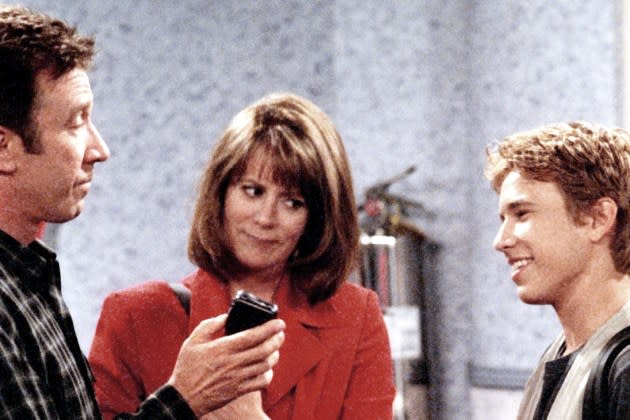Patricia Richardson Says ABC Chose to End ‘Home Improvement’ After Equal Pay Proposal

Patricia Richardson has opened up about how her pay disparity on Home Improvement led to the series’ end.
“When I took the job, they said it wasn’t meant to be the Tim Allen show. It was meant to be our show,” the actress told the Los Angeles Times.
More from The Hollywood Reporter
Diane Ford, Stand-Up Comic on HBO Specials and 'An Evening at the Improv,' Dies at 68
Casey Wilson Says Tim Allen Was "So F***ing Rude" on 'Santa Clauses' Set
But when it came to pay and credits, Richardson indicates the two weren’t treated equally.
Richardson recalled that for the show’s third season, she managed to renegotiate her contract to secure a guarantee of four episodes per season focused on her character, Jill Taylor, along with a profit share point that entitled her to a backend percentage of the series’ earnings.
“I knew that residuals just get less and less, and I felt that I am going to end up being a huge part of whatever this show is,” she said. “It’s going to work because of me almost as much as because of Tim.”
While Richardson was able to share her input on her character, guiding the male-dominated writers room on how to write for the matriarch of the Taylor family, she was denied a producer credit, she says, arguing that was allegedly due to a fear that it would set a precedent for other actors. However, Allen was credited as an executive consultant in the first season and later became an executive producer during the sixth.
Home Improvement co-creator and executive producer Carmen Finestra denied this, claiming it was likely Disney’s decision to not give Richardson the producer credit.
When the show reached its eighth season, Richardson wanted to leave it, as she wanted to spend more time with her children following her divorce from Ray Baker. According to the actress, both she and Allen were on the same page about the series needing to end after its lengthy run.
She explained that she received an offer of $1 million per episode, while Allen was offered $2 million. Using the pay disparity to her advantage, Richardson proposed that ABC should pay her the same amount as Allen and give her an executive producer title, or else she would leave.
“I knew that Disney would in no way pay me that much. That was my way to say ‘no’ and was a little bit of a flip-off to Disney,” explained Richardson. “I’d been there all this time, and they never even paid me a third of what Tim was making, and I was working my ass off. I was a big reason why women were watching.”
As she predicted, her proposal was rejected, she recalled, and the series came to an end.
“I was mad at Tim because he was leaving me alone being the only person saying no, which made me feel terrible and like the bad guy and he was upset with me for leaving,” Richardson said of the tension between her and Allen toward the end of the series.
The former co-stars went on to reunite in 2015 for Last Man Standing, though Richardson confirmed the two have not kept in touch.
Richardson also argued that, while fans have reconnected with many of their favorite TV shows from the ’90s thanks to streaming, Home Improvement hasn’t received the same treatment despite being a hit sitcom.
“Hollywood hates our show,” she said. “When they talk about what the best shows of the ‘90s were, they will not give Home Improvement credit.”
She believes that Allen being a vocal conservative has hurt former fans’ connection to the show. “I think it’s about Tim, and it’s about his politics,” said Richardson. She added that she doesn’t personally like his political leanings, either.
This hasn’t stopped her from championing the series. “I’m really proud of what it meant to our audience,” she said. “I don’t care what anybody says, I’m proud of the legacy.”
A rep for Allen told the Times he wasn’t available to comment.
Best of The Hollywood Reporter